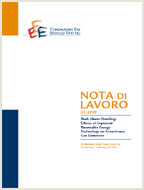Modeling Coupled Climate, Ecosystems, and Economic Systems

Data
15.07.2015
15.07.2015
Autori
W. A. Brock (Department of Economics – University of Wisconsin, Department of Economics – University of Missouri); A. Xepapadeas (Department of International and European Economic Studies – Athens University of Economics and Business)
Codice JEL
Q20, Q40, Q54, Q57
Q20, Q40, Q54, Q57
Parole chiave:
Coupled Ecological/Economic Models, Climate Change, Deep Uncertainty, Robust Control, Cumulative Carbon Budgeting, Energy Balance Climate Models, spatial Aspects in Ecological/Economic Modeling
Coupled Ecological/Economic Models, Climate Change, Deep Uncertainty, Robust Control, Cumulative Carbon Budgeting, Energy Balance Climate Models, spatial Aspects in Ecological/Economic Modeling
Publisher
Climate Change and Sustainable Development
Climate Change and Sustainable Development
Editor
Carlo Carraro
Carlo Carraro
Human economies and ecosystems form a coupled system coevolving in time and space, since human economies use ecosystems services and at the same time affect ecosystems through their production and consumption activities. The study of the interactions between human economies and ecosystems is fundamental for the efficient use of natural resources and the protection of the environment. This necessitates the development and use of models capable of tracing the main interactions, links and feedbacks. In developing this chapter, our objective was to focus on a segment of rapidly developing literature on coupled ecological/economic models with an emphasis on climate change. The advantage of this approach is that it introduces the reader to a very important current research topic, but it also allows, by using climate as the reference ecosystem, the exploration of new modeling approaches which are relevant and useful for the modeling of other types of coupled ecological/economic systems. These include modeling of deep structural uncertainty by using robust control methods, exploring modeling through cumulative carbon budgeting, studying spatial transport phenomena and spatial aspects in economic/ecological modelling.
***
Suggested citation: Brock, W. A., A. Xepapadeas, (2015), ‘Modeling Coupled Climate, Ecosystems, and Economic Systems’, Nota di Lavoro 66.2015, Milan, Italy: Fondazione Eni Enrico Mattei.
